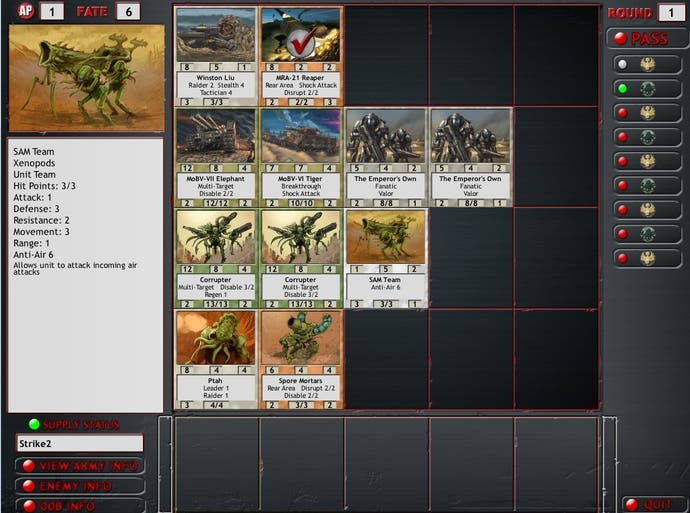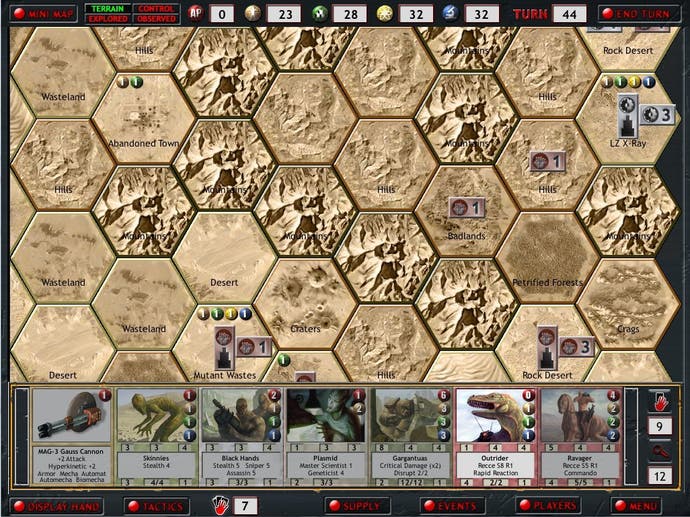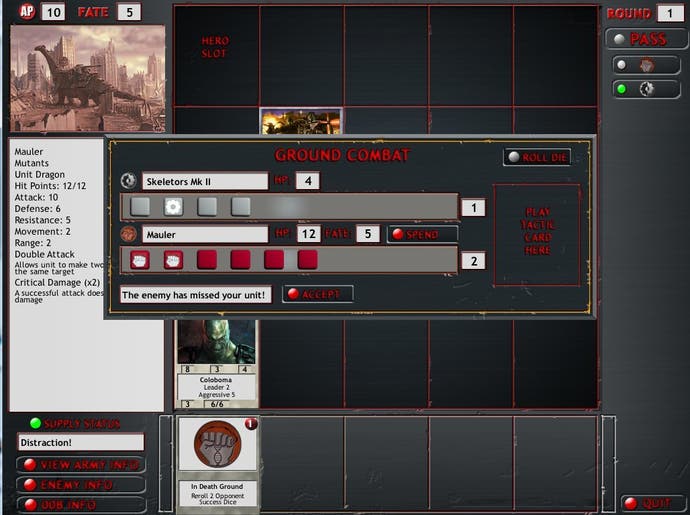Armageddon Empires
Mad Hex: Return to Thunderroll.
There's something about December that makes me crave turn-based strategy. I don't know what it is - some kind of deep grained memory that when you can't go outside it's time to play boardgames or something. While I've been dabbling with everything from Fantasy Wars to (just starting) the New Galacitic Civilization beta, this is what's been dominating.
Dominating everything.
At the time of writing, a copy of Mass Effect sits unopened in the next room. Interviews with everyone from Warren Spector to Blood Red Shoes remain determinedly untranscribed. Rooms remain untidied (though that's a same-as-it-ever-was). It's compulsive, challenging, thought provoking, atmospheric and as generally neat an indie-strategy game I've played since - oooh - Weird Worlds: Return to Infinite Space. (And while Weird Worlds is more polished, Armageddon Empire has many times more depth.)
It's a 4X game, which stands for "I'm incapable of realising what letter starts a word" (or rather, "eXplore, eXpand, eXploit and eXterminate", which are the primary goals). You start in the corner of the map, and go forth exploring it corners, making new bases, collecting neat stuff and finally kicking the heads of anyone who has the audacity to start on the same map thoroughly in. File next to GalCiv, Civilization, and many other things with "iv" in them.
If I had to narrow it down, it's got three things which are its stand-out features, and core to its appeal. Its setting. Its recruitment mechanism. Its length. It's a post-apocalyptic game with a card-playing/deck building mechanism in lieu of (most) of its traditional building and you can play it in a relatively short time. Most games last one to three hours, though you can expand it up or down depending on changing the size of the map.
The card mechanism is the first thing you'll notice. Taking inspiration from games like Magic: The Gathering (in mechanisms, not in terms of paying money for a piece of card with a fancy orc with some numbers printed on), you can only put units into play which are in your "hand". Before the game, you design a deck of cards - each of the game's four sides have their own unique selections - up to a set point value (i.e. harder cards cost more). Or, if you're lazy or don't know what the hell's going on, you can pick a predefined one. Then, when you start, you get dealt a hand of cards, and you can bring them into play as and when you get enough resources (i.e. hard cards require you have secured more bits of space-floss and jam than others).

It takes a while to realise, but the card mechanism integrates tightly into the setting. It's a post-apocalypse game - in other words, about not having much stuff. Once you've gone through your deck of cards... that's it. If a hero's killed in play, they're gone forever. If you only put one enormous death robot in your deck, and he gets turned to bolts, you're not getting another one. This leads you to thinking carefully, both about what units you want to have available, and their fates when you get them.
The third facet - that it's short - means that so you can experiment with more tactics, decks, approaches and just play more games. I'd argue this brings the strategy more sharply into focus than it does with a longer game - the link between your decisions and the resultant actions is clearer, meaning you really do know when you've made a hideous error.
Esentially, it's a glorified boardgame. Like most of its peers, really. But while most turn-based strategy games are glorified boardgames, Armageddon Empires makes it explicit. It actually shows you the dice as they roll, for example. However, it's a boardgame which would require such complex book-keeping to play on a tabletop that the only sane thing to do is turn to a computer. And it's a glorified boardgame which makes me want to glorify it.
Why do I love it so much? I think it comes down to meaningful decisions. Tying into your limited deck, it's a game were all your decisions are about scarcity. For example, rather than being able to order all your units every turn, you're provided a number of action points to spend. In most cases, you'll have about twenty action-points' worth of stuff you'd like to do, and only ten or so to play with. What do you prioritise? Is it more important to move your scouts or reinforce your bases? Play another card or draw another one from the deck? To save them for researching new weapons or keep them so you can play tactic cards during battles?
(And away from the action points, you also have to worry about resources, number of cards, where to explore, etc - the choices pile up.)
What adds a second edge to the action-points decisions is that it's not a stable reservoir. At the start of every turn, dice are rolled to determine which side goes first. As well as having the initiative, whoever rolls highest also gets more points, so can do more stuff. To help secure it, you can spend your resources on buying more dice. Of course, if you do that you won't have them to spend on constructing new material. The pay-off is tense, rewarding and totally game-shaping. Identifying when you need to win is critical - hell, one of the joys is when you have the AI on the ropes, having sprung a trap to capture his (Armageddon Empire's AI are men - I don't know why, I just know they are) capital and he spends as many resources as he can to make sure he gets to go first, in a desperate attempt to foil the plan. You lean back and laugh at the desperation.

(It's always a good sign when you start to actually picture the thought pattern behind computer players' actions. This makes them more human. This makes it more of a pleasure to kick them in their vulnerable hexes.)
As all the mentions of dice rolling suggests, it means the game involves a lot of luck. This is actually one of the reasons why it's so tense - like some kind of HyperRisk, you may know the odds are enormously in your favour, but you can't be completely sure. But in all the games I've played, it hasn't felt random, and that's due to all those decisions yo get to make. You've massaged the odds in whatever what you think best. Now let's see them roll.
All of which is so brilliant, that it saddened me that I realised I probably, in good faith, should give it a seven. Technically it's hardly exemplary - programmed in Macromedia Director, it's limited to a single resolution. Its buttons, especially when battles clash, can be a little sluggish. It occasionally throws up a scripting error for some reason - restarts are very occasionally needed, though the auto-save feature normally covers you. Away from that, it's also deeply inaccessible - while the manual is in-depth, there's no in-game training bar button pop-ups, the game doesn't have enough decks to show you what to do (in fact, you have to download a few of the factions basic deck from the Cryptic Comet site). The interface hides information from you in the most bizarre ways - for example, some actions requiring you to select an army's icon and right-click, and others requiring you to go into the army and select the individual unit. I learned to play by starting several games, going along until I realised something fundamental I was missing completely (like, say, how to build a resource-gatherer on a square), then restarted. Oh - and the mini-map actually obscures the top left corner, requiring you to turn it on and off to see what's going on up there. The deck builder especially does its best to be unfriendly. Also, while a flexible and deep game - the levels are randomly generated, with maps and encounters always being a surprise - it's missing several elements you may expect. For example, no hot-seat multiplayer or anything resembling a predefined series of missions.
But it's getting an eight anyway, because what it has on its side kind of overrules other considerations: it's up there with any strategy game released this year, and if you have any affection for the genre whatsoever, you'll adore it. In fact, I suspect it may end up as a minor classic of the genre.

It's obviously a work of love. For example, despite the fact the only sense of the factions are the pictures at the top of each card, you genuinely know who each are. Take the Free Mutants' Zentrads. All I know about them is the picture: a bare-chested giant with some manner of Merlin-from-Excalibur-esque skull-cap, with their hands clasped around the head of an unfortunate soldier's helmet, squeezing. From the coldly malicious look and the almost laziness of the action, it's clear that the skull's about to pop and there's nothing the soldier's going to do with it. The "s" at the end of Zentrad implies the unit includes loads of these guys, and their enormous attack value plus the commando special ability (so allowing them to act without supply - supply being another one of the tactical considerations that weigh on your every decision which I haven't room to talk about). And from that, I've got the image of some kind of brutal mutant elite and... well, when they go into action I know them. Same's true for - say - the Zombie Launcher (picture: a square WW2-styled launcher, in silhouette, with a figure propelled from it instead of missile). Or any of them, really. I was unsurprised to discover the developer's got enough background on the world which isn't in the game to make him talk about writing a novel set there. For a hex-based game to have this sense of place implies he's thought it all through.
This sense of real armies viewed through the abstract dice-rolling shows best in the combat, one of the mini-sections requiring its own set of tactics. Armies are divided into two rows, with only artillery able to engage from the back. You take turns to attack. Since each card has its own abilities, the order you use them is where you win or lose. The card with Shock Attack, if it hits, will prevent a unit from attacking, if they haven't yet, for example. Do you use this card first? If so, who do you aim at? What if it misses - perhaps it'll be better if your hardest hitter engages before the other side's Shock Attack can come into play. And that's one special ability. There's dozens. And there's influence of generals, tactic cards, equipments, supply, assassination and... DECISIONS. IT IS A GAME ABOUT DECISIONS. IT IS ABOUT MORE DECISIONS THAN YOU CAN FIT IN A REVIEW BUT - CRUCIALLY - NOT MORE DECISIONS YOU CAN FIT IN YOUR HEAD.
This is exactly what we play strategy games for.
All other considerations, ultimately, are secondary. It's a game about meaningful decisions. The first, most meaningful decision, surely, is to play the demo and buy the bloody thing.

